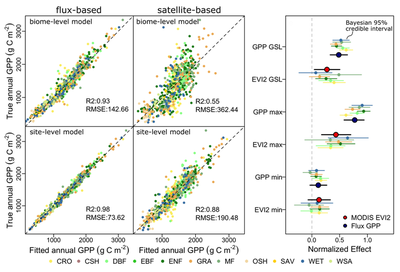SEAL is excited for AGU!
We haven’t had many posts here because with the return to a mostly-in-person office format, the semester has apparently flown by. That being said, with the return of AGU this year (12-17 Dec), SEAL is excited for a number of us to go to New Orleans in person to present our research using both oral and poster presentations. Though some of us are a bit more interested in the beignets than others (cough Josh cough), we’re all looking forward to having a conference experience as a group!
Because AGU is hybrid, the format is a bit different than pre-Covid. Those of us giving oral presentations, for example, have our recorded talks online for viewing for registered attendees. Then, we will be in-person for 5-minute overview lightning talks in our respective sessions. Posters will be both online and in-person. If you’re at AGU this year, be sure to watch our presentations and/or come see us in person!
Here is everyone presenting:
Izzi
- Title: Monitoring Crop Development in Smallholder Farms Using Remotely Sensed Time Series Data Augmentation
- Session: B42C:03, Thursday 16 Dec 10:00 [oral]
- Overview: Smallholder farms play an integral role in global efforts to achieve food security, but their capacity to adapt to climate changes is largely unknown. Dense remotely sensed time series offer a way to monitor crop development and management practices in smallholder fields, to assess their current practices and capacity to further adapt. However, time series from public satellite data lack the observation densities required to accurately monitor these changes, and commercial satellite data (e.g., from PlanetScope) are financially and computationally costly. We introduce an approach to augment time series of publicly available satellite data with optimally useful PlanetScope observations to determine the minimum amount of commercial PlanetScope data needed to effectively monitor crop development.

Xiaojie
- Title: Satellite observations underestimate the effect of growing season length on global vegetation productivity
- Session: B32B-04, Wednesday 15 Dec 10:05 [oral]
- Overview: Vegetation productivity plays a critical role in regulating global carbon cycle dynamics, which is important to understanding future climate warming. Many studies have shown an increase in gross vegetation productivity due to widely observed extended vegetation growing season lengths. However, it is challenging to quantify the sensitivity of vegetation productivity to the extended growing season length over the large spatial scales because vegetation productivity can only be measured directly on the ground. In this study, we used a more extensive ground measured vegetation productivity dataset than previous studies and corresponding satellite observations to investigate the sensitivity of vegetation productivity to growing season length over the globe and across many biome types. We found that satellite observations underestimated the growing season effect on gross vegetation productivity by 30% on average across biome types. But we also suggest that satellite observations can be informative in investigating carbon cycle dynamics over large scale if carefully account for biases and uncertainties.

Ian
- Title: We Can’t Have It Both Ways - Accepting the Trade-off of Detection Time and Accuracy in Multi-source, Near Real-time Deforestation Monitoring
- Session: B32B-08, Wednesday 15 Dec 10:25 [oral]
- Overview: This research provides 3 overall contributions: first, we can combine satellite sensor data by a simple data fusion (as opposed to intensive image fusion), which can potentially allow for faster results when doing near real-time monitoring. Second, similar to what other studies have shown, using a multi-source approach overall improves detection of forest disturbances, there remains some volatility when including Sentinel-1. Finally, trade-offs exist between accuracy and latency in a monitoring context. While our specific values are for our study region, we expect this trade-off principle holds true elsewhere. We suggest in monitoring studies, therefore, that researchers specify their parameter choices and explain why they chose that particular set.

Laura
- Title: Monitoring Change With Heterogeneous Satellites: A Multivariate Bayesian Online Changepoint Detection Approach
- Session: B45I-1737, Thursday 16 Dec 16:00 [poster]
- Overview: Near real time change detection is important for a variety of Earth monitoring applications and remains a high priority for remote sensing science. Bayesian Online Changepoint Detection (BOCPD) elegantly monitors multiple satellite signals simultaneously based on a recursively updating multivariate regression model. Incorporation of prior information enables a relaxed dependence on an extensive stable period, making this method applicable to shorter time series and multiple change point detection. The approach is sensitive to subtle changes while maintaining competitive latency with other time series based methods.

Josh
- Title: Observing Long-Term Annual land Surface Phenology at Medium Spatial Resolution
- Session: B34C-06, Wednesday 15 Dec 15:11 [oral]
- Overview: Time series sparsity has largely prevented the creation of long-term, moderate resolution land surface phenology. This has limited our understanding of local to landscape scale spatial patterns and long term variability. We introduce a Bayesian hierarchical modeling approach and use it to create over 35 years of 30 m resolution phenometrics with uncertainty. These data compare favorably with ground observations and the MSLSP30NA product.
